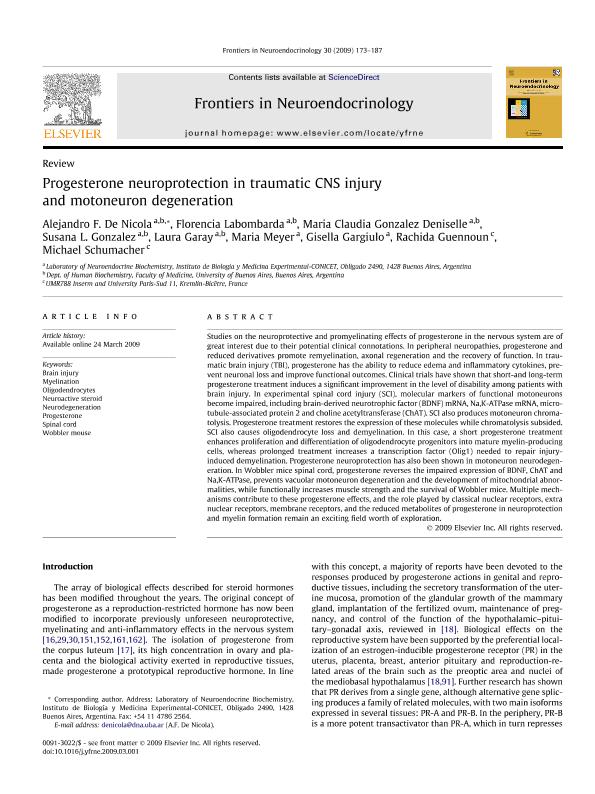Artículo
Progesterone Neuroprotection in traumatic CNS injury and motoneuron degeneration
de Nicola, Alejandro Federico ; Labombarda, Maria Florencia
; Labombarda, Maria Florencia ; Gonzalez Deniselle, Maria Claudia
; Gonzalez Deniselle, Maria Claudia ; Gonzalez, Susana Laura
; Gonzalez, Susana Laura ; Garay, Laura Ines
; Garay, Laura Ines ; Meyer, Maria
; Meyer, Maria ; Gargiulo Monachelli, Gisella Mariana
; Gargiulo Monachelli, Gisella Mariana ; Guennoun, Rachida; Schummacher, Michale
; Guennoun, Rachida; Schummacher, Michale
 ; Labombarda, Maria Florencia
; Labombarda, Maria Florencia ; Gonzalez Deniselle, Maria Claudia
; Gonzalez Deniselle, Maria Claudia ; Gonzalez, Susana Laura
; Gonzalez, Susana Laura ; Garay, Laura Ines
; Garay, Laura Ines ; Meyer, Maria
; Meyer, Maria ; Gargiulo Monachelli, Gisella Mariana
; Gargiulo Monachelli, Gisella Mariana ; Guennoun, Rachida; Schummacher, Michale
; Guennoun, Rachida; Schummacher, Michale
Fecha de publicación:
2009
Editorial:
Elsevier
Revista:
Frontiers In Neuroendocrinology
ISSN:
0091-3022
e-ISSN:
1090-2430
Idioma:
Inglés
Tipo de recurso:
Artículo publicado
Clasificación temática:
Resumen
Studies on the neuroprotective and promyelinating effects of progesterone in the nervous system are of great interest due to their potential clinical connotations. In peripheral neuropathies, progesterone and reduced derivatives promote remyelination, axonal regeneration and the recovery of function. In traumatic brain injury (TBI), progesterone has the ability to reduce edema and inflammatory cytokines, prevent neuronal loss and improve functional outcomes. Clinical trials have shown that short-and long-term progesterone treatment induces a significant improvement in the level of disability among patients with brain injury. In experimental spinal cord injury (SCI), molecular markers of functional motoneurons become impaired, including brain-derived neurotrophic factor (BDNF) mRNA, Na,K-ATPase mRNA, microtubule- associated protein 2 and choline acetyltransferase (ChAT). SCI also produces motoneuron chromatolysis. Progesterone treatment restores the expression of these molecules while chromatolysis subsided. SCI also causes oligodendrocyte loss and demyelination. In this case, a short progesterone treatment enhances proliferation and differentiation of oligodendrocyte progenitors into mature myelin-producing cells, whereas prolonged treatment increases a transcription factor (Olig1) needed to repair injuryinduced demyelination. Progesterone neuroprotection has also been shown in motoneuron neurodegeneration. In Wobbler mice spinal cord, progesterone reverses the impaired expression of BDNF, ChAT and Na,K-ATPase, prevents vacuolar motoneuron degeneration and the development of mitochondrial abnormalities, while functionally increases muscle strength and the survival of Wobbler mice. Multiple mechanisms contribute to these progesterone effects, and the role played by classical nuclear receptors, extra nuclear receptors, membrane receptors, and the reduced metabolites of progesterone in neuroprotection and myelin formation remain an exciting field worth of exploration.
Palabras clave:
Neuroprotection
,
Steroids
,
Neurodegeneration
,
Spinal Cord Injury
,
Progesterone
Archivos asociados
Licencia
Identificadores
Colecciones
Articulos(IBYME)
Articulos de INST.DE BIOLOGIA Y MEDICINA EXPERIMENTAL (I)
Articulos de INST.DE BIOLOGIA Y MEDICINA EXPERIMENTAL (I)
Citación
de Nicola, Alejandro Federico; Labombarda, Maria Florencia; Gonzalez Deniselle, Maria Claudia; Gonzalez, Susana Laura; Garay, Laura Ines; et al.; Progesterone Neuroprotection in traumatic CNS injury and motoneuron degeneration; Elsevier; Frontiers In Neuroendocrinology; 30; 2; 2009; 173-187
Compartir
Altmétricas



